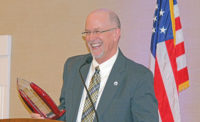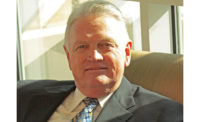In a business that has grown increasingly complex, Alan Rindlisbacher has found success in practicing his mantra of “showing up,” something he has done for the past 22 years at Layton Construction.
Rindlisbacher, director of marketing and communications for Layton, was presented with ENR Mountain States Intermountain Legacy Award this fall. He announced earlier this year that he will retire in 2019 from the Sandy, Utah-based general contractor after a long career.
“I’m not retiring so much as going to go out and try something else,” says Rindlisbacher. “I want to do a 180 and go try something different. If I were going to stay in the industry, I wouldn’t walk out the door because being part of the team at Layton is like my family.”
But Rindlisbacher hasn’t confined himself to one role at Layton Construction. He has gradually crafted a position at the company and within the wider industry that is part business development, part marketing, part public relations and part “telling the story.”
“When we hired Alan, we didn’t have a particular job title or role spelled out,” says David Layton, president of the company. “We just knew he was a super-talented guy and we would find a way to put him to work in our organization. We sort of turned him loose to do what he does and told him to go make things happen, and that is exactly what he’s done.”
A Career of Connections
A native of northern Utah’s Cache Valley, Rindlisbacher graduated from Utah State University with a degree in business administration and a minor in economics. After college, he coordinated conferences at Utah State University and then at the Salt Lake Area Chamber of Commerce before becoming president of the Economic Development Corp. of Utah. Layton says he met Rindlisbacher while Alan was working for the state of Utah as the director for the Division of Business and Economic Development (now known as the Governor’s Office of Economic Development).
Throughout his career, Rindlisbacher says he has tried to have a presence in a wide range of organizations, especially those that allowed him to build personal connections within the community.
“When I came [to Layton], I tried to bring a new approach,” he says. “I wanted to build our presence in the market by telling our story and reaching out. If you write a check to be part of an organization and don’t show up, then you’ve just made a charitable contribution.”
“My philosophy is the philosophy of showing up. Most people just don’t show up. You have to be out there, being involved and trying to make a difference. You keep showing up and eventually you get your chance and you start to make a return on that investment.”
While at Layton, Rindlisbacher has volunteered with organizations ranging from municipal chambers of commerce to the Visit Salt Lake Convention and Visitors Bureau and the Utah chapter of the National Association of Industrial and Office Properties.
Scott Beck, president and CEO of Visit Salt Lake Convention and Visitors Bureau, where Rindlisbacher continues to serve as chair of the executive committee, says he has learned a lot from working with Rindlisbacher over many years.
“Alan understands the connectedness of the world and how important it is to be connected across different groups in a way not a lot of people see,” Beck says. “He could always tell me who in a room I needed to meet and how they were connected to someone else. He was a real mentor to me.”
Layton says Rindlisbacher has become a master of personal interaction.
“I’ll be out somewhere with Alan and everybody knows him,” Layton says. “If I can’t think of someone’s name, I can describe them to Alan and he’ll know who I’m talking about. I’ve said he’s my human Rolodex.”
Since arriving at Layton Construction, Rindlisbacher has emphasized building a presence in the wider community. The company’s executives have become increasingly involved in charitable and professional organizations.
“All our vice presidents have been involved in different community groups. We want to have a presence there because in the end we are all interested in seeing Utah grow,” Rindlisbacher says.
Economic Growth
Over his professional career, Rindlisbacher played a part in the growth of the state’s economy, bringing major projects to the Wasatch Front and Layton Construction.
While working in economic development for the state, he and his team helped numerous companies open operations in Utah, including Frito Lay, Micron (now IM Flash) and Discover Card Services as well as many smaller operations with less recognizable names.
“We brought in a company that manufactures industrial fans, mostly for the mining industry. I was out the other day and drove past their building, and they are still here, employing about 60 people doing welding and making good money doing skilled work,” he says. “It makes you feel good knowing you had a hand in that.”
Theresa Foxley, CEO of the Economic Development Corp. of Utah, worked with Rindlisbacher and praised his efforts in building successful teams to improve the community.
“Alan is one of the most positive, community-oriented individuals I know and collaborating with him is a joy,” Foxley says. “Alan is always interested in putting the community first, and I think that has been the secret to his success.”
During his time at Layton, Rindlisbacher landed high-profile projects along the Wasatch Front, including the 21,000-seat conference center for the Church of Jesus Christ of Latter-day Saints, major portions of the mixed-use Gateway Center, the Eccles Theater in downtown Salt Lake City, the Montage Deer Valley Resort and Spa and the newly completed Hale Theatre in Sandy. Led by significant growth in the hospitality and health care markets, Layton Construction has expanded its presence outside Utah and now has 11 offices ranging from Hawaii to Tennessee and Florida.
“These days, I’ll come to work and maybe start by checking in with our office in Nashville and then work my way west,” Rindlisbacher says.
But Layton says that even with the growth, Rindlisbacher has continued to use a personal touch in telling the company’s story.
“We were building a distribution center for Macy’s in Tulsa, and Alan knew that to the people there, landing this project was big deal. He arranged for this really impressive groundbreaking ceremony, bigger than you might usually do for something like that,” Layton says. “He made sure all the right officials were there and the people from our team were there. It was a lot of effort, but he knew it was important. He’ll do things like that and the next day be working with someone from Modern Healthcare magazine to talk about a health care project we’re working on. He has a personal touch with so many people in our company and our clients.”
Rindlisbacher says that while technology has been the biggest driver of change during his career, he still prefers personal interaction.
“Social media is great, and it can be used to help tell your story, but I think it has yet to make a real difference,” he says. “Maybe that will change in the future. But I think it is still important to have that personal relationship and be able to look someone in the eye and say, ‘Here is what we can do—how we can make a difference and drive a predicable outcome.’ You can’t do that with a Tweet.”





